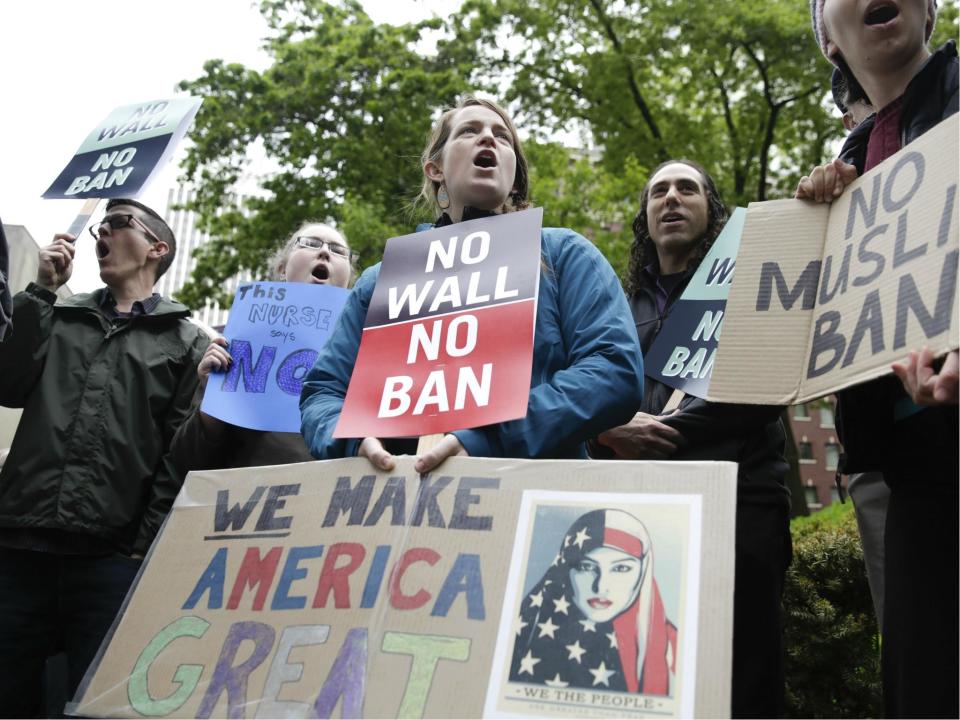Second federal judge rules against Trump travel ban stating the President's words prove it's aimed at Muslims

A second federal judge, this time in Maryland, has ruled against Donald Trump's travel ban and used his own words to do it.
US District Judge Theodore D. Chuang cited the president's tweets and comments during his 2016 campaign as evidence that the third iteration of the ban is unconstitutional.
Mr Chuang said it was the “inextricable re-animation of the twice-enjoined Muslim ban,” the Washington Post reported.
Mr Watson and Mr Chuang both said Mr Trump had overstepped his authority given by Congress in imposing immigration law and that it was based on religious discrimination, however Mr Chuang's ruling in Maryland did not find that the administration "violated a different part of federal immigration law requiring him to find entry of certain non-immigrant travelers would be “detrimental” to US interests before blocking them," per the newspaper.
Mr Chuang cited Mr Trump's repeated campaign promise to have a “complete shutdown of Muslims entering the United States" and subsequent comments and travel bans as evidence of a violation of the Constitution's protection of freedom of religion.
He also referenced the president's reaction to the second version of the travel ban was also blocked by federal judges when Mr Trump said: "we ought to go back to the first one and go all the way, which is what I wanted to do in the first place.”
Mr Trump's tweets about a false story regarding First World War General John Pershing's use of bullets dipped in pig's blood against Muslims and directing people to "study" what "did to terrorists when caught" was also referenced in the ruling.
The President also said in September that the travel ban should "be far larger, tougher and more specific-but stupidly, that would not be politically correct!"
The ruling is "less complete" than the Hawaii ruling, according to the Washington Post; it directs blocking the administration's enforcement only on those who lack a "bona fide" relationship with a US person or entity.
The Hawaii ruling, made by Derrick K Watson, had blocked the administration from enforcing the travel ban order on anyone from six countries: Syria, Libya, Iran, Yemen, Chad, Somalia.
The other two countries added to the latest travel ban version, North Korea and Venezuela, were left out of the Hawaii and Maryland rulings.
Experts have said the Trump administration added those non-Muslim majority countries to the travel ban in order to argue against the claim that it is an unconstitutional "Muslim ban."
Both this and the similar the Hawaii ruling from 17 October are temporary and meant to stay the enforcement as the case is argued.
The US Department of Justice is planning to appeal the Hawaii ruling and will likely do so for the Maryland ruling as well.
The White House said in a statement that the Hawaii ruling “undercuts the President’s efforts to keep the American people safe and enforce minimum security standards for entry" into the US.
This third version of the travel ban also caused controversy due to the exclusion of Sudan, but the addition of Chad.
The administration said the reason for the Sahel region country’s inclusion, in particular, was because Chad failed to “adequately share public-safety and terrorism-related information.”
“What does that mean? Chad is desperately poor. ... It has a tough army but limited bureaucratic capacity,” John Campbell, a former US ambassador to Nigeria, told BuzzFeed News.
Other experts said the same could be said for several developing nations and even some wealthier nations bogged down with bureaucratic procedures or shifting political leadership.
Chad’s addition has baffled regional experts and former State Department officials as it plays a cooperative and key role in the fight against extremist groups like Isis-West Africa, al-Qaeda, and Boko Haram.
“One explanation for why the Trump administration added Chad is incompetence,” Geoff Porter, President of North Africa Risk Consulting, previously told The Independent.
He added that “it is entirely unclear” why Chad was included in the new ban when the number of Chadians in the US or visiting the US “is less than negligible.”
It provided the only continental force in the Trans-Saharan Counterterrorism Partnership, which is funded by the US, as well as providing troops to the UN Peacekeeping force in nearby Mali.
He explained the country’s military force has been “instrumental in combating al Qaeda affiliated groups in neighbouring countries like Niger and Nigeria” as well.
The US military not only has a base in the country but recently a 20-nation exercise with US Africa Command to fight extremists was held there.
The US Army, Navy, and Marines have also trained Chadian forces and the State Department spent $300m (£22m) on a new embassy in the capital city of N'Djamena.
The Sudanese government is still considered a state sponsor of terrorism and accused of carrying out a genocide in the Darfur region by the US State Department.

 Yahoo News
Yahoo News 